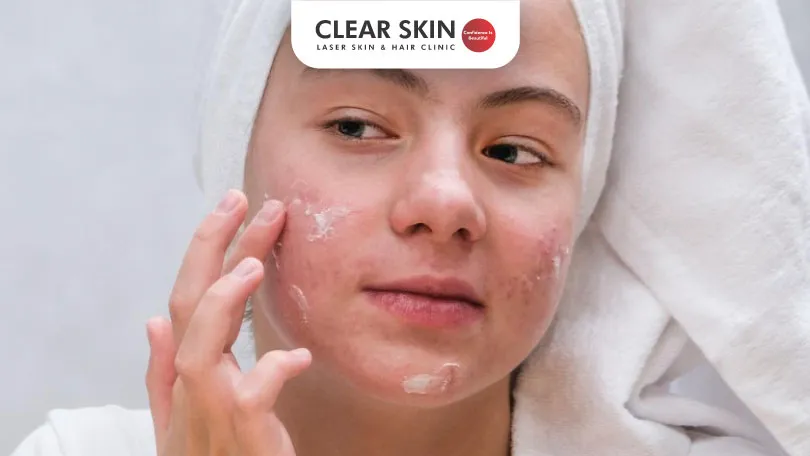Dermatologist’s Guide to Reducing Acne Redness

Written by Clear Skin Content Team | Medically Reviewed by Dr. Dhanraj Chavan on April 20, 2023

We aim to provide you with information and techniques that can help improve your skin’s appearance, boosting its health and your self esteem. This guide merges scientific knowledge with practical advice for addressing acne redness. We ensure that our recommendations are helpful and easy to understand for those looking to enhance their skin health.
Table Of Content
- Exploring the Causes of Redness in Acne
- Skincare Routines to Reduce Acne-Related Redness
- Professional Treatments for Acne Redness
- Practical Tips for Preventing Future Acne Redness
- Conclusion
Exploring the Causes of Redness in Acne
Before we explore methods to decrease acne redness, it’s crucial to grasp the underlying causes. Acne is a common skin issue caused by clogged hair follicles. It is often associated with inflammation, which is the body’s natural response to acne sebum and bacteria in it.
The redness associated with acne is caused by this inflammation, which leads to the formation of red swollen pimples. When the skin is inflamed, blood vessels dilate, increasing blood flow to the affected area. Many times these new dilated blood vessels remain the same even after the pimple heals. This leads to the red appearance commonly seen with acne.
Several factors, such as genetics, hormones, scarring and specific medications, can contribute to acne redness. But skin inflammation remains the most important one. Identifying the underlying reason for your acne and the inflammation associated with it can assist in determining the most suitable treatment options
Distinguishing Between Inflammatory and Non-inflammatory Acne:
It’s important to differentiate between inflammatory and non-inflammatory acne. Redness, swelling, and pain are common characteristics of inflammatory acne, also known as pimples. If left untreated, this form of acne can lead to scarring.
Non-inflammatory acne consists of blackheads and whiteheads. Blocked pores typically cause these but do not lead to redness or swelling. Even though they might not be pronounced, they can still impact the uniformity of your skin tone.
Skin Types and Skin Sensitivity can Contribute to Redness:
Individuals with sensitive skin may be more susceptible to redness caused by acne. This occurs because sensitive skin can easily get irritated and inflamed by the smallest of triggers like strong skincare products, topical medicines, sun exposure or environmental pollutants.
Moreover, individuals with oily skin are also more prone to developing redness due to acne. Excessive oil production can irritate the skin promoting more inflammation in acne lesions.
Identifying your skin type and using products tailored to your needs can help prevent this irritation and redness.
Skincare Routines to Reduce Acne-Related Redness
Establishing a mild and calming skincare regimen is crucial for handling redness and irritation caused by acne. Here is a detailed step-by-step guide to help reduce inflammation and achieve a healthier, clearer complexion:
- Begin with a Gentle Cleanser: Opt for a mild, soap-free cleanser suitable for sensitive skin. Use it twice daily to cleanse the skin without causing dryness. Steer clear of vigorous scrubbing to prevent worsening redness.
- Include toner in your routine: Select an alcohol-free toner containing soothing ingredients such as witch hazel or green tea to calm the skin and minimize inflammation. Use a soft cotton pad after cleansing.
- Consider using a light moisturizer. Ensuring proper skin hydration is essential. Choose a non-comedogenic, lightweight moisturizer to avoid pore blockage. Ceramides and hyaluronic acid are effective in soothing and hydrating the skin.
- Consider using a serum with niacinamide to help decrease redness and inflammation and enhance the skin’s barrier function. Remember to apply it before moisturizing.
- Make sure to use sunscreen daily. Ensure your skin stays protected by applying broad-spectrum sunscreen with an SPF of 30 or higher every morning, even on cloudy days.
- Try a Spot Treatment: Opt for a spot treatment when using strong topicals like benzoyl peroxide or salicylic acid for specific areas. Use a small amount to prevent the skin from becoming too dry.
- Gentle Exfoliation: Consider using a gentle exfoliant such as lactic acid, to eliminate dead skin cells and encourage cell renewal without irritation.
Consistency is crucial for achieving and maintaining results. It’s essential to patch-test new products to avoid any potential irritation before adding them to your skincare routine.
Professional Treatments for Acne Redness
If you are looking for quick relief from severe acne redness, dermatological treatments can be very effective.
Topical corticosteroids are frequently recommended for their potent anti-inflammatory effects, offering quick relief from sudden redness and swelling. Nevertheless, it is essential to have a professional closely monitor their usage to prevent any potential side effects from prolonged use.
Utilizing laser and light therapies is a promising approach for reducing long-term redness. Procedures like Intense Pulsed Light (IPL) and pulsed dye lasers focus on blood vessels to reduce redness without harming nearby tissue. Usually performed by a skilled dermatologist, these procedures can significantly reduce the redness over multiple sessions.
Chemical peels offer another option for reducing redness associated with acne. Through exfoliation, chemical peels can eliminate dead skin cells, clear pores, and enhance the skin’s texture. Based on the skin’s sensitivity and the severity of the acne, a professional can suggest the most suitable type and frequency of peels for the best outcomes.
Practical Tips for Preventing Future Acne Redness
Making specific lifestyle changes can make a significant difference to better manage acne redness.
First and Foremost, it is Essential to Consider Dietary Factors:
By including anti-inflammatory foods like fatty fish, leafy greens, berries, and nuts in your diet, you can effectively decrease skin inflammation and redness. This way of eating not only improves your skin but also your overall health.
Effective Stress Management Techniques are Also Crucial:
Long-term stress can worsen acne by causing inflammation in the body. Participating in activities such as yoga, meditation, or even moderate exercise can assist in managing stress levels, which can lessen the severity of acne redness.
When Choosing Skincare Products, Choose Non-comedogenic Options Tailored for Sensitive or Acne-prone Skin:
Using products with ingredients like niacinamide, known for its anti-inflammatory properties, can be especially effective in calming redness. It’s crucial to carefully read labels and seek professional advice to ensure the products you select won’t irritate your skin.
By making these lifestyle and dietary changes and choosing the right skincare products, you can reduce acne redness and achieve healthier, clearer skin.
Addressing acne redness requires a holistic strategy that encompasses expert treatments, dietary adjustments, stress control, and careful selection of skincare items. It’s important to remember that each person’s skin is unique, and what may be effective for one individual may not be for another. Therefore, it is important to seek personalized advice and solutions.
Do You Know?
Roughly 250 Patients Are Treated
Everyday By These Dermatologists
(You are one click away from flawless skin)
Meet Our Dermatologist!
Conclusion
Acne Redness involves understanding its causes and adopting a comprehensive approach to skincare and lifestyle habits. By focusing on reducing inflammation, choosing suitable skincare products, and considering professional treatments when necessary, individuals can effectively manage and minimize acne-related redness.
Additionally, incorporating dietary changes and stress management techniques can further support overall skin health. It’s important to seek personalized advice from dermatologists to tailor treatments and routines to individual skin types and needs. With consistent care and attention, achieving clearer, healthier skin is within reach for those dealing with acne redness. Contact us to know more.
Further Reading
Why Pune’s Climate Triggers More Acne Breakouts Than Other Cities
Discover how Pune’s air pollution with PM2.5 levels 8.5x above safe limits worsens acne. Dr. Dhanraj Chavan shares dermatologist-approved protection strategies and treatment options.
Best Age for Anti-Ageing Treatments
Understand when to start anti-ageing treatments. Expert skincare guide for your 20s, 30s, and 40s from Clear Skin dermatologists in Pune.
How to Get Rid of Acne Scars Fast?
Safe acne scar treatment for Indian skin tones. Dermatologist-planned procedures to reduce scars and improve skin texture.
Does Pune’s Air Pollution Worsen Acne? Dermatologist Insights
Discover how Pune’s air pollution with PM2.5 levels 8.5x above safe limits worsens acne. Dr. Dhanraj Chavan shares dermatologist-approved protection strategies and treatment options.
Have thoughts? Please let us know
We are committed not only to treating you, but also educating you.





